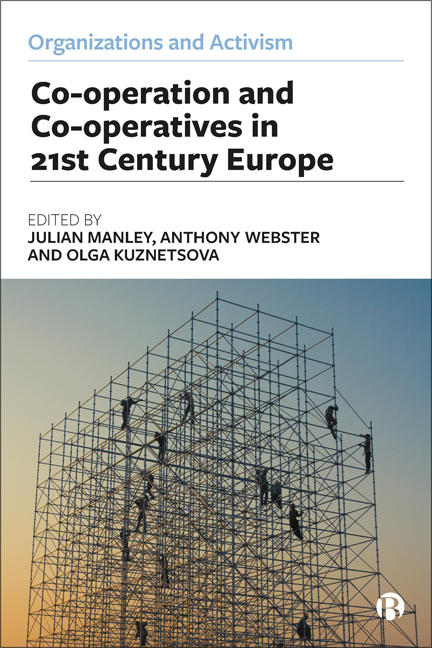Book contents
- Frontmatter
- Dedication
- Contents
- Series Editors’ Preface
- List of Figures and Tables
- List of Abbreviations
- Notes on the Contributors
- Acknowledgements
- Foreword
- 1 Introduction: European Co-operativism in a Changing World
- PART I Seeds: Identifying the Space for Co-operatives in Addressing Social Challenges
- PART II Bridges: Co-operative Culture and Education
- PART III Growth: The Preston Model, Co-operation and Community Wealth Building
- Index
Series Editors’ Preface
Published online by Cambridge University Press: 28 March 2024
- Frontmatter
- Dedication
- Contents
- Series Editors’ Preface
- List of Figures and Tables
- List of Abbreviations
- Notes on the Contributors
- Acknowledgements
- Foreword
- 1 Introduction: European Co-operativism in a Changing World
- PART I Seeds: Identifying the Space for Co-operatives in Addressing Social Challenges
- PART II Bridges: Co-operative Culture and Education
- PART III Growth: The Preston Model, Co-operation and Community Wealth Building
- Index
Summary
Organizing is politics made durable. From co-operatives to corporations, Occupy to Meta, states and NGOs, organizations shape our lives. They shape the possible futures of governance, policy making and social change, and hence are central to understanding how human beings can deal with the challenges that face us, whether that be pandemics, populism or climate change. This book series publishes work that explore how politics happens within and because of organizations and organizing. We want to explore how activism is organized and how activists change organizations. We are also interested in the forms of resistance to activism, in the ways that powerful interests contest and reframe demands for change. These are questions of huge relevance to scholars in sociology, politics, geography, management and beyond, and are becoming ever more important as demands for impact and engagement change the way that academics imagine their work. They are also important to anyone who wants to understand more about the theory and practice of organizing, not just the abstracted ideologies of capitalism taught in business schools.
Our books offer critical examinations of organizations as sites of or targets for activism, and we will also assume that our authors, and hopefully our readers, are themselves agents of change. Titles may focus on specific industries or fields, or they may be arranged around particular themes or challenges. Our topics might include the alternative economy; surveillance, whistleblowing and human rights; digital politics; religious groups; social movements; NGOs; feminism and anarchist organization; action research and co-production; activism and the neoliberal university, and any other subjects that are relevant and topical.
‘Organizations and Activism’ is also a multidisciplinary series. Contributions from all and any relevant academic fields will be welcomed. The series is international in outlook, and proposals from outside the English-speaking global north are particularly welcome.
This book, the fourth in our series so far, is the first to directly address one of the oldest forms of business-based activism – cooperative organizing. In the UK, The Rochdale Society of Equitable Pioneers, founded in 1844, is usually cited as the first example of an organization which was owned and controlled by workers.
- Type
- Chapter
- Information
- Publisher: Bristol University PressPrint publication year: 2023

